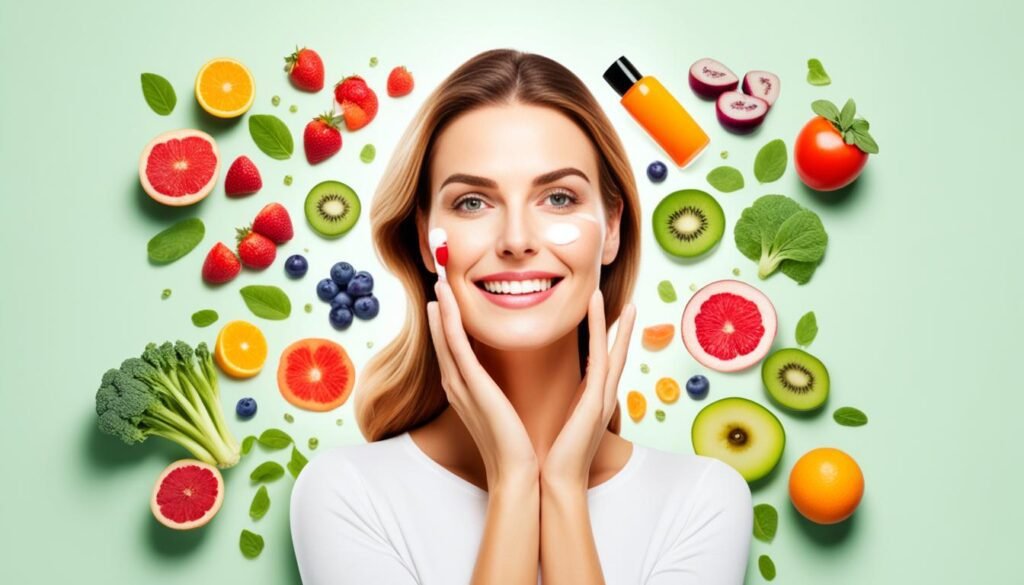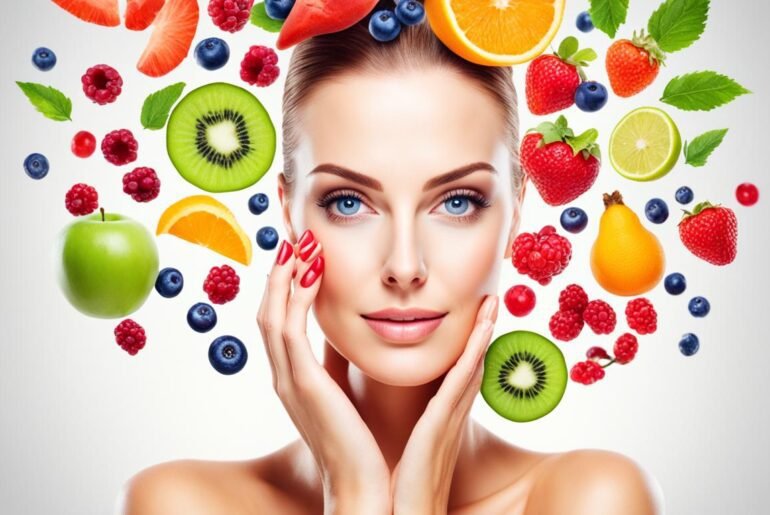Did you know that the average person’s skin is exposed to over 168 hours of sunlight per month?
That’s a significant amount of time under the sun’s harmful UV rays, which can lead to skin damage, premature aging, and increased risk of skin cancer. But here’s the good news: antioxidants can help!
Antioxidants are substances that protect our cells from the damaging effects of free radicals, unstable molecules that can cause oxidative stress and contribute to skin problems like wrinkles, pigmentation, and inflammation. By neutralizing these free radicals, antioxidants help maintain healthy, youthful-looking skin.
In this article, I’ll delve into the world of antioxidants for skin health. We’ll explore the benefits of antioxidants, their role in skincare products, the importance of a healthy diet, and much more. So let’s dive in and discover how antioxidants can revolutionize your skincare routine and promote a radiant complexion!
Key Takeaways:
- Antioxidants protect the skin from free radical damage.
- They help prevent premature aging, wrinkles, and inflammation.
- Antioxidants can be found in skincare products, foods, and supplements.
- A healthy diet rich in antioxidants is essential for skin health.
- Topical antioxidants can provide targeted protection and nourishment.
How Antioxidants Benefit the Skin
Antioxidants play a significant role in maintaining skin health and protecting against the damaging effects of free radicals and oxidative stress. Whether obtained through food, supplements, or skincare products, antioxidants offer a range of benefits for the skin.
- Protection against harmful UV radiation: Antioxidants act as a natural defense system, shielding the skin from the harmful effects of UV radiation. By neutralizing free radicals, antioxidants help prevent DNA damage and reduce the risk of sunburn, premature aging, and skin cancer.
- Improved hydration: Antioxidants help retain moisture in the skin, promoting hydration and preventing dryness. This not only helps maintain a healthy and supple complexion but also reduces the appearance of fine lines and wrinkles.
- Stimulation of collagen and elastin production: Antioxidants stimulate the production of collagen and elastin, two essential proteins that contribute to the skin’s firmness, elasticity, and overall youthfulness. Increased collagen and elastin production can help reduce the appearance of wrinkles and sagging skin.
- Reduction in wrinkles and pigmentation: Through their protective and reparative properties, antioxidants can minimize the appearance of wrinkles, fine lines, and age spots. By promoting cell regeneration and skin renewal, antioxidants contribute to a more even skin tone and a brighter complexion.
- Support for healing processes: Antioxidants assist in the skin’s natural healing processes, helping to repair damaged cells, reduce inflammation, and minimize scarring. This makes antioxidants particularly beneficial for individuals with acne-prone or sensitive skin.
- Reduced inflammation: Inflammation is a common concern for many skin conditions, including acne, rosacea, and eczema. Antioxidants have anti-inflammatory properties that can help calm and soothe irritated skin, promoting a healthier and more balanced complexion.
Furthermore, emerging research suggests that antioxidants may also play a role in preventing specific skin conditions, such as vitiligo, atopic dermatitis, and acne. While more studies are needed to fully understand and explore these potential benefits, the existing evidence showcases antioxidants’ promise in maintaining skin health and vitality.
“Antioxidants act as a natural defense system, shielding the skin from the harmful effects of UV radiation.”
To enhance the benefits of antioxidants for your skin, incorporate antioxidant-rich skincare products into your routine. Look for products that contain top antioxidants for the skin, such as vitamins C and E, green tea extract, resveratrol, and coenzyme Q10. These antioxidants have been extensively studied and proven effective in promoting skin health and combating the signs of aging.
While external application of antioxidants through skincare products is essential, it is equally vital to nourish your skin from within. A diet rich in antioxidants, including fruits, vegetables, berries, and whole grains, can provide essential nutrients that benefit your skin’s health and appearance.
Top Antioxidants for Skin:
| Antioxidant | Sources |
|---|---|
| Vitamin C | Citrus fruits, berries, kiwi, bell peppers, broccoli |
| Vitamin E | Almonds, spinach, sunflower seeds, avocados, hazelnuts |
| Vitamin A | Sweet potatoes, carrots, kale, butternut squash, spinach |
| Resveratrol | Red grapes, berries, dark chocolate, peanuts, red wine |
| Green tea extract | Green tea, matcha |
Note: The above table showcases some of the most well-known antioxidants for skin health. However, there are many more antioxidants found in various foods and supplements that can benefit the skin.
Antioxidants in Skin Care Products

When it comes to maintaining skin health, incorporating antioxidants into your skincare routine is essential. Many skincare products on the market today are formulated with powerful antioxidants that can help nourish and protect your skin.
One common antioxidant found in skincare products is retinoids, which are derivatives of vitamin A. Retinol, a popular form of retinoids, has been proven to improve skin tone, pigmentation, and texture. By promoting cell turnover, retinol can help with anti-aging concerns and even out the skin’s appearance.
Vitamin C is another key antioxidant frequently used in skincare products. It is the most abundant antioxidant in human skin and has a range of benefits. Vitamin C can help brighten the complexion, reduce hyperpigmentation, and improve the appearance of fine lines and wrinkles. Its antioxidant properties also help protect the skin from environmental damage.
Vitamin E is known for its ability to protect against free radicals, which can cause premature aging and skin damage. This antioxidant can help moisturize the skin, improve elasticity, and reduce the risk of skin cancer. Using skincare products enriched with vitamin E can provide an extra layer of protection for your skin.
When choosing skincare products with antioxidants, it’s important to consider your skin type and any allergies or sensitivities you may have. Look for products that are specifically formulated for your skin concerns. For example, if you have sensitive skin, opt for gentle formulations without added fragrances. If you have oily skin, choose products that are oil-free and non-comedogenic to avoid clogging pores.
Investing in skincare products with antioxidants can help promote healthy skin and combat the effects of environmental stressors. These antioxidants work to neutralize free radicals and reduce the signs of aging, leaving your skin looking radiant and youthful.
| Antioxidant | Benefits |
|---|---|
| Retinoids | Improves skin tone, pigmentation, and texture |
| Vitamin C | Brightens the complexion, reduces hyperpigmentation, and diminishes fine lines and wrinkles |
| Vitamin E | Protects against free radicals, moisturizes the skin, improves elasticity, and reduces the risk of skin cancer |
Using skincare products with antioxidants can enhance your daily skincare routine and contribute to maintaining healthier skin. However, it’s important to remember that consistency is key. Regularly using these products and combining them with a balanced diet rich in antioxidants can help maximize the overall benefits for your skin.
Antioxidants in Foods and Supplements
Antioxidants play a crucial role in maintaining skin health by protecting against free radical damage. While a healthy, varied diet is the most cost-effective way to improve skin health, supplements and skincare products can also provide a convenient source of antioxidants.
One of the best ways to incorporate antioxidants into your diet is through a wide range of nutritious foods. Fruits, vegetables, berries, coffee, green tea, and cacao are all rich in antioxidants that can benefit your skin. By including these foods in your daily meals, you can naturally boost your antioxidant intake and support the health of your skin.
| Food Sources | Antioxidants |
|---|---|
| Fruits | Vitamin C, anthocyanins |
| Vegetables | Carotenoids, vitamin E |
| Berries | Ellagic acid, resveratrol |
| Coffee | Chlorogenic acid |
| Green tea | Catechins |
| Cacao | Flavanols |
In addition to a balanced diet, antioxidant supplements can be a convenient way to ensure you’re getting adequate amounts of these beneficial compounds. Some common antioxidant supplements for skin health include vitamins A, C, and E, selenium, zinc, carotenoids, flavonoids, and polyphenols. However, it’s important to consult with a healthcare professional before starting any new supplements to ensure they’re appropriate for your specific needs.
When it comes to skincare products, many formulations now include antioxidants to provide additional benefits for the skin. These products may contain ingredients like retinoids, vitamin C, and vitamin E, which can help protect against free radical damage and promote healthier-looking skin.
By incorporating antioxidant-rich foods, supplements, and skincare products into your daily routine, you can enhance your overall skin health. Remember, however, that skincare is a multifaceted approach, and it’s important to combine external and internal care for optimal results.
The Role of Antioxidants in Sun Protection

When it comes to maintaining skin health, antioxidants play a crucial role, especially in sun protection. These powerful compounds can help protect the skin from the damaging effects of UV radiation and prevent long-term damage. Let’s explore the benefits of antioxidants in keeping your skin safe and healthy under the sun.
Reducing DNA Damage and Supporting Skin Structure
Exposure to UV radiation can cause DNA damage in the skin cells, leading to premature aging, wrinkling, and an increased risk of skin cancer. Antioxidants, such as vitamin C and vitamin E, can help reduce this damage by neutralizing harmful free radicals and preventing oxidative stress. By doing so, they support the production of collagen and elastin, which are essential for maintaining the skin’s structure and elasticity.
Improving Hydration and Moisture Balance
Extended sun exposure can deplete the skin’s moisture levels, leaving it dry, flaky, and prone to irritation. Antioxidants, like hyaluronic acid and ceramides, help improve hydration by attracting and retaining moisture in the skin. This not only helps restore the skin’s natural moisture barrier but also provides a plumping effect, reducing the appearance of fine lines and wrinkles.
Replenishing Vitamin E Levels and Photoprotection
Vitamin E is a potent antioxidant that helps protect the skin against the harmful effects of UV radiation. It works synergistically with vitamin C, replenishing its levels in the skin and enhancing its photoprotective properties. Together, these antioxidants can neutralize free radicals generated by sun exposure, reducing inflammation and preventing DNA damage.
To further enhance sun protection, it’s important to incorporate a broad-spectrum sunscreen with an SPF of 30 or higher into your skincare routine. This will provide an additional layer of defense against UVA and UVB rays, complementing the benefits of antioxidants.
Summary
Antioxidants are invaluable in maintaining skin health, particularly in sun protection. By reducing DNA damage, supporting skin structure, improving hydration, and replenishing vitamin E levels, they play a crucial role in keeping your skin safe and healthy under the sun. Combine the power of antioxidants with a broad-spectrum sunscreen for maximum sun protection and overall skin health.
Potential Side Effects and Precautions
While antioxidants offer many benefits for skin health, it’s important to use them responsibly. Large doses of antioxidants for prolonged periods may cause adverse effects. Some individuals may experience skin allergies or dryness when using certain antioxidants, such as retinoids. Pregnant individuals should avoid retinoids, and those with hormonal acne should consult a dermatologist before use. It’s always best to consult a healthcare professional before starting any new supplement or skincare regimen.
Understanding the Risks
Although antioxidants are generally safe and beneficial for the skin, it’s important to be aware of potential risks and side effects. Excessive intake of antioxidants, such as through high-dose supplements, may disrupt the delicate balance of antioxidants and free radicals in the body. This imbalance may lead to unwanted effects and undermine the body’s natural defense mechanisms.
Individuals with certain medical conditions, such as kidney or liver disease, should exercise caution when taking antioxidant supplements. These conditions can affect the body’s ability to process and eliminate excess antioxidants, potentially leading to toxicity.
Precautions for Specific Antioxidants
Specific antioxidants may have their own set of precautions and considerations. One example is retinoids, which are commonly used in skincare products for their anti-aging properties. While retinoids can be highly effective, they can also cause skin irritation, redness, and dryness, especially when used in high concentrations or by individuals with sensitive skin. Pregnant individuals are advised to avoid retinoids due to the potential risk of birth defects.
When using skincare products with antioxidants, it’s essential to read the instructions and follow the recommended usage guidelines. Overusing products or combining multiple products with high concentrations of antioxidants can overwhelm the skin and lead to adverse reactions.
Consultation with Healthcare Professionals
Before incorporating antioxidant supplements or starting a new skincare regimen, it’s crucial to consult with a qualified healthcare professional. They can assess your individual needs, consider any underlying health conditions or medications, and provide personalized recommendations.
A healthcare professional can also help determine the appropriate dosage and duration of antioxidant supplements, taking into account factors such as age, overall health, and specific skin concerns. They may also evaluate any potential interactions between supplements and medications to ensure their safety and effectiveness.
The Importance of Patch Testing
To prevent adverse reactions and allergies, it’s advisable to conduct a patch test before using skincare products containing antioxidants. Apply a small amount of the product to a discreet area of skin, such as the inner forearm, and monitor for any signs of redness, itching, or irritation for 24 to 48 hours.
If a negative reaction occurs during the patch test, it’s best to discontinue use and seek guidance from a healthcare professional or dermatologist. They can help identify the specific antioxidant or ingredient causing the reaction and recommend suitable alternatives.
Choosing the Right Skin Care Products
When it comes to taking care of your skin, choosing the right products is key. With so many options available, it can be overwhelming to find the best skincare products for your specific needs. However, by understanding your skin type and concerns, you can select products that will effectively address your skin’s unique requirements.
If you have sensitive skin, it’s important to opt for gentle, fragrance-free products. These formulations are designed to minimize the risk of irritation and allergic reactions. Look for labels that indicate suitability for sensitive skin or products specifically formulated for delicate skin types.
On the other hand, if you have oily skin, you may benefit from oil-controlling formulations. These products can help reduce excess sebum production and keep your skin looking matte and shine-free throughout the day. Look for labels that mention oil-free or oil-controlling properties when selecting skincare products.
One important factor to consider when choosing skincare products is the inclusion of antioxidants. Antioxidants play a vital role in maintaining skin health and protecting against free radical damage. Look for products that contain antioxidants like retinoids, vitamin C, and vitamin E. These powerful antioxidants can help boost collagen production, improve skin tone and texture, and protect against environmental stressors.
When it comes to selecting skincare products with antioxidants, it’s also essential to consider other beneficial ingredients for your specific skin type. For example, if you have dry skin, look for products with hydrating ingredients like hyaluronic acid or ceramides. If you struggle with acne-prone skin, consider products with salicylic acid or tea tree oil to help control breakouts.
Remember to always patch test new skincare products before applying them to your entire face. This can help you determine if a product is suitable for your skin and prevent any potential adverse reactions.
Top Antioxidants to Look for in Skincare Products
- Retinoids: Promote collagen production and improve skin texture.
- Vitamin C: Brightens the skin, reduces hyperpigmentation, and boosts collagen synthesis.
- Vitamin E: Protects the skin from environmental damage and helps retain moisture.
By carefully selecting skincare products that cater to your skin type and incorporate the right antioxidants, you can effectively support your skin’s health and maintain a radiant complexion. However, it’s important to note that individual skin types and sensitivities may vary, so it’s always a good idea to consult with a dermatologist or skincare professional for personalized recommendations.
Stay tuned for the next section, where we will explore the importance of a healthy diet for optimal skin health!
The Importance of a Healthy Diet for Skin Health
A healthy diet plays a crucial role in maintaining skin health. The foods we consume provide essential nutrients that nourish our skin from within, supporting its overall health and appearance. One key factor in a healthy diet for skin health is the consumption of antioxidants, which can be found in a variety of fruits, vegetables, and whole grains.
Antioxidants, such as vitamins A, C, and E, selenium, and zinc, play a significant role in protecting the skin from free radicals and oxidative stress. These harmful substances can cause damage to cells, leading to premature aging, inflammation, and other skin concerns. By incorporating antioxidant-rich foods into your diet, you can help counteract the effects of free radical damage and promote a radiant, healthy complexion.
Some natural skin antioxidants include citrus fruits, berries, leafy greens, nuts, and seeds. These foods are not only delicious but also provide an abundance of vitamins, minerals, and phytochemicals that can benefit your skin. Along with antioxidants, a healthy diet for skin health should also include a variety of other nutrients, such as omega-3 fatty acids, collagen-building proteins, and hydration-promoting fluids.
By nourishing your skin from within through a balanced diet, you can enhance the effects of topical skincare products. While topical products can provide direct nourishment and protection to the skin’s outermost layer, a healthy diet ensures that your skin receives a continuous supply of essential nutrients from the inside out.
The Benefits of a Healthy Diet for Skin Health:
- Promotes a radiant, healthy complexion
- Protects against free radical damage and oxidative stress
- Delays the signs of aging, such as wrinkles and fine lines
- Supports collagen and elastin production for improved skin elasticity
- Reduces inflammation and skin sensitivity
- Improves skin hydration and overall skin texture
- Enhances the effectiveness of topical skincare products
Antioxidant-Rich Foods for Skin Health
| Fruits | Vegetables | Whole Grains | Other Sources |
|---|---|---|---|
| Oranges | Spinach | Brown rice | Green tea |
| Berries | Kale | Oats | Cocoa |
| Watermelon | Carrots | Quinoa | Nuts and seeds |
| Pomegranate | Broccoli | Whole wheat bread | Legumes |
Incorporating these antioxidant-rich foods into your daily diet can have a positive impact on your skin health. Remember to practice moderation and maintain a balanced diet to ensure you’re receiving a wide range of nutrients for overall well-being. Furthermore, consulting a healthcare professional or registered dietitian can provide personalized guidance to help you optimize your diet for optimal skin health.
The Power of Topical Antioxidants

When it comes to maintaining skin health, the use of topical antioxidants can have a powerful impact. These antioxidants, applied directly to the skin, provide targeted protection and nourishment, helping to keep your skin looking its best. One key antioxidant that has proven benefits for the skin is vitamin C.
Studies have shown that vitamin C has anti-aging properties and can help brighten the complexion when applied topically. It helps neutralize free radicals and boost collagen production, resulting in a more youthful and radiant appearance. In addition to vitamin C, there are other antioxidants, such as vitamin E and green tea extract, that offer their own unique benefits for the skin.
When incorporating topical antioxidants into your skincare routine, it’s important to choose products with stable and effective forms of antioxidants. This ensures that the antioxidants can penetrate the skin and provide their optimal benefits. Look for products with packaging that protects the antioxidants from air and light exposure, as these factors can degrade their efficacy.
Choosing antioxidant-rich skincare products with potent formulations can make a significant difference in the health and appearance of your skin.
By incorporating antioxidant-rich skincare products into your routine, you can combat the harmful effects of free radicals and promote a healthier complexion. Remember to consult with a skincare professional to determine the best antioxidants for your skin type and specific concerns.
The Future of Antioxidant Research in Skincare
The field of skincare is ever-evolving, and the future holds exciting possibilities for antioxidant research. While our understanding of antioxidants and their impact on skin health continues to grow, there is still much to learn about their exact mechanisms and how they can be maximized for optimal benefits. Ongoing studies are shedding light on the potential synergistic effects of different antioxidants and their interactions with other skincare ingredients.
Scientists are exploring innovative ways to harness the power of antioxidants and develop groundbreaking formulations that offer enhanced efficacy and safety. Future research may focus on determining the optimal dosage of antioxidants for different skin types and conditions, as well as finding the best formulations to ensure maximum absorption and bioavailability.
With advancements in technology, researchers are also uncovering new antioxidant compounds and extracts from natural sources that possess potent skincare benefits. These discoveries pave the way for the development of antioxidant-rich skincare products that can address a wide range of skin concerns, including anti-aging, brightening, and soothing.
The future of antioxidant research in skincare holds immense potential for revolutionizing the way we approach skincare and unlocking the full benefits of these remarkable compounds. As scientists delve deeper into the intricacies of antioxidants, we can look forward to skincare products that are even more effective, innovative, and tailored to meet the diverse needs of individuals seeking to maintain healthy and radiant skin.
Stay Tuned for Exciting Advancements
The world of skincare is constantly evolving, and it’s an exciting time for antioxidant research. As we continue to unravel the mysteries of antioxidants and their impact on skin health, stay tuned for future advancements that will shape the skincare industry. By combining scientific rigor with innovative formulation techniques, skincare brands are poised to deliver cutting-edge products that harness the power of antioxidants for maintaining skin health.
Conclusion
Antioxidants are essential for maintaining skin health and protecting against free radical damage. Whether obtained through a balanced diet, supplements, or topical skincare products, incorporating antioxidants into your routine can have numerous benefits for your skin.
Antioxidants work by neutralizing harmful free radicals, which are unstable molecules that can cause cellular damage and contribute to premature aging. By reducing oxidative stress, antioxidants help to maintain a youthful and radiant complexion.
To reap the benefits of antioxidants, focus on consuming a variety of fruits, vegetables, and whole grains that are rich in these powerful compounds. Additionally, consider supplementing your diet with antioxidant-rich vitamins and minerals, such as vitamins A, C, and E, selenium, and zinc.
When it comes to skincare, look for products that contain antioxidants like retinoids, vitamin C, and vitamin E. These ingredients can help protect your skin from environmental stressors, improve hydration, promote collagen production, and reduce the appearance of wrinkles and pigmentation.
In conclusion, by embracing an antioxidant-rich skincare routine and following a healthy diet, you can support the overall health and appearance of your skin. However, it’s always a good idea to consult with a healthcare professional before making any significant changes to your skincare or dietary regimen to ensure it is suitable for your individual needs.
FAQ
What are antioxidants and how do they benefit the skin?
Antioxidants are substances that counteract free radicals and protect against oxidative stress. They improve hydration, stimulate collagen production, reduce wrinkles and pigmentation, support healing processes, and reduce inflammation, thereby maintaining healthy skin.
Where can I find antioxidants for skin health?
Antioxidants can be found in food, supplements, and skin care products. Foods rich in antioxidants include fruits, vegetables, berries, coffee, green tea, and cacao. Antioxidant supplements contain vitamins A, C, and E, selenium, zinc, carotenoids, flavonoids, and polyphenols. Skin care products often contain antioxidants like retinoids, vitamin C, and vitamin E.
How do antioxidants protect the skin from sun damage?
Antioxidants protect the skin from harmful UV radiation by reducing DNA damage, improving hydration, and supporting the production of collagen and elastin. Vitamin C, for example, replenishes vitamin E levels and has photoprotective properties. It’s still important to wear sunscreen with SPF 30 or higher for added protection.
Are there any potential side effects or precautions when using antioxidants?
High doses of antioxidants for prolonged periods may have adverse effects. Some individuals may experience skin allergies or dryness when using certain antioxidants like retinoids. Pregnant individuals should avoid retinoids, and those with hormonal acne should consult a dermatologist before use. Always consult a healthcare professional before starting any new supplement or skincare regimen.
How do I choose the right skin care products with antioxidants?
To choose the right skin care products, consider your skin type and any allergies or sensitivities you may have. Look for products that contain antioxidants like retinoids, vitamin C, and vitamin E, as well as other beneficial ingredients suitable for your skin type.
How does a healthy diet contribute to skin health?
A healthy diet plays a crucial role in maintaining skin health. Consuming foods rich in antioxidants, such as fruits, vegetables, and whole grains, provides essential nutrients for skin health. Antioxidants like vitamins A, C, and E, selenium, and zinc are particularly important in promoting a radiant, healthy complexion.
Can topical antioxidants be beneficial for the skin?
Yes, topical antioxidants can provide targeted protection and nourishment for the skin. For example, vitamin C has anti-aging and brightening properties when applied topically. It’s important to choose products with stable and effective forms of antioxidants, as well as proper packaging to protect them from air and light exposure.
What does the future of antioxidant research in skincare look like?
Ongoing research continues to explore the potential benefits of antioxidants for skin health. Scientists are studying the synergistic effects of different antioxidants and their interactions with other skincare ingredients. Future studies may focus on optimizing dosage and formulation for maximum efficacy and safety.
What are the key takeaways about antioxidants for maintaining skin health?
Antioxidants play a crucial role in maintaining skin health by protecting against free radical damage. They can be obtained through a healthy diet, supplements, and topical skincare products. By incorporating antioxidants into your skincare routine and following a balanced diet, you can enhance the overall health and appearance of your skin.




